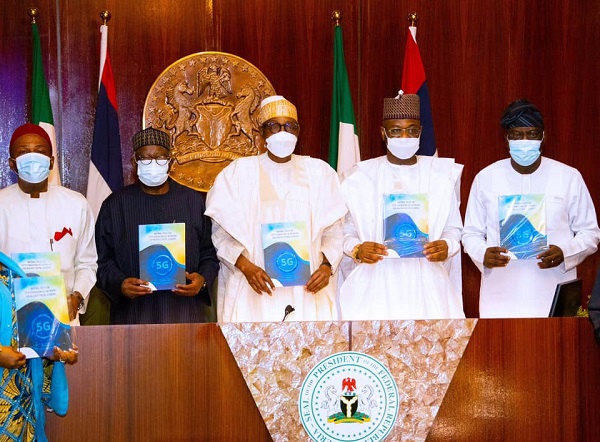…directs Pantami to oversee multi-stakeholder implementation

President Muhammadu Buhari has officially launched the National Policy on Fifth Generation (5G) networks which have a vital role to play in Nigeria’s quest for a digital economy.
Speaking at the ceremony today (January 25) at the State House, Abuja, he directed the Minister of Communications and Digital Economy, Prof. Isa Pantami to oversee a multi-stakeholder implementation of the policy, being done by the Nigerian Communications Commission (NCC) with the support of other government institutions.
Also, he urged all stakeholders to ensure compliance for the successful implementation of the policy.
Recall that Pantami presented the policy which was approved at the Federal Executive Council (FEC) meeting on September 8, 2021, following a robust debate – a move described as the current administration’s commitment to supporting the digital economy as an enabler for the diversification of Nigeria’s national economy.
Giving the history of the National Policy, Buhari said the journey started with the launch of the National Digital Economy Policy and Strategy (NDEPS) in November 2019, adding that the government has also launched several policies to strengthen the digital economy, including the Nigerian National Broadband Plan (NNBP) and the National Policy for the Promotion of Indigenous Content in the Nigerian telecommunications sector.
“The process of developing our National 5G Policy has been painstaking, inclusive and focused. We commenced the process with 5G trials in some selected locations in November 2019.
“Multi-sectoral stakeholders then deliberated on the report of the trials to ensure that health, security and other concerns were effectively addressed in developing a policy that suits our country. The National 5G Policy will position Nigeria to harness the potentials of 5G technologies for further development of the economy and improve the indices of well-being in the nation.
“5G technologies offer several benefits that can support virtually every sector of our economy. For instance, it can enhance connectivity, improve healthcare, support education, foster smart cities and boost agriculture, among other things. Also, it will support security institutions with real-time communication.
“5G technology is significantly faster than earlier digital technologies and it provides near real-time communication. This can play a key role in boosting our efforts towards enhancing security across the nation. It will enable our security institutions to effectively deploy robotics, autonomous vehicles, augmented and virtual reality to address any security challenges that we face. To this end, I hereby direct all the security institutions to immediately leverage 5G when deployed, to beef-up security in the country.
“The National 5G Policy includes a deployment plan to ensure that major cities across the country benefit from the technologies. It also seeks to make 5G a major driver of our economy, a catalyst for smart cities in the country and a platform for the creation of jobs that support our digital economy. We assure investors that we will continue to provide an enabling environment for their businesses to be very successful as we roll out this technology,” he added.
President Buhari commended the minister for his commitment and consistency towards the delivery of the mandate of developing Nigeria’s digital economy. The progress has been unprecedented and truly commendable.
Earlier in his presentation, Pantami stated that the 5G network will play a vital role in improving the security situation in the country.
“5G network is a viable platform for security institutions to leverage on in tackling the security challenges that have bedevilled the country, by harnessing the potential of digital technologies such as artificial intelligence (AI), augmented reality (AR), virtual reality (VR), robotics etc., which explore real-time information for maximum efficiency,” he added.


